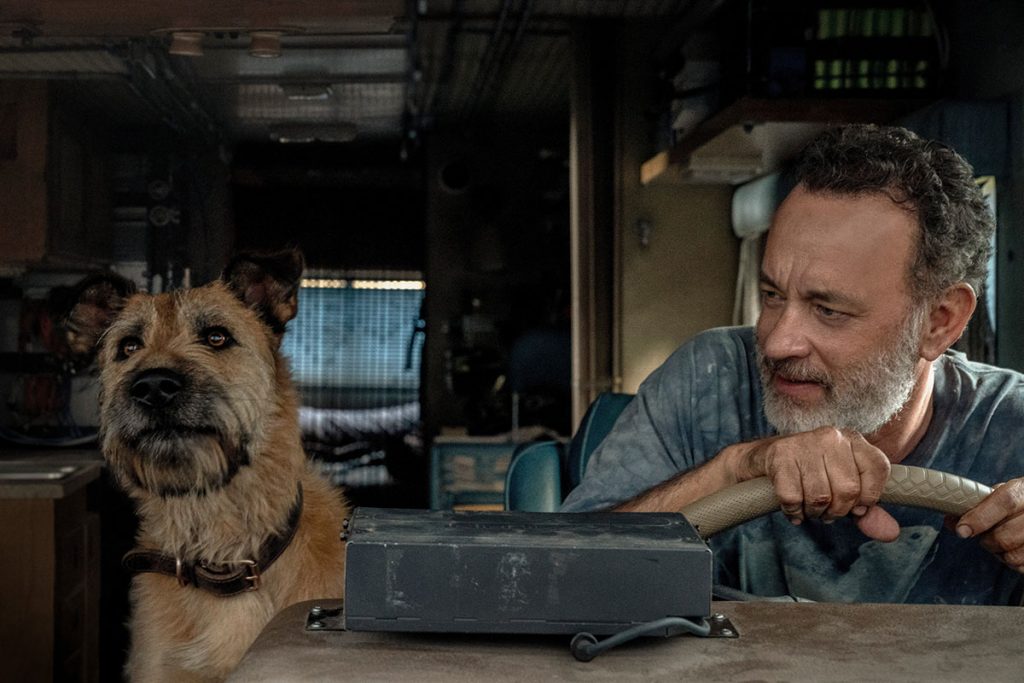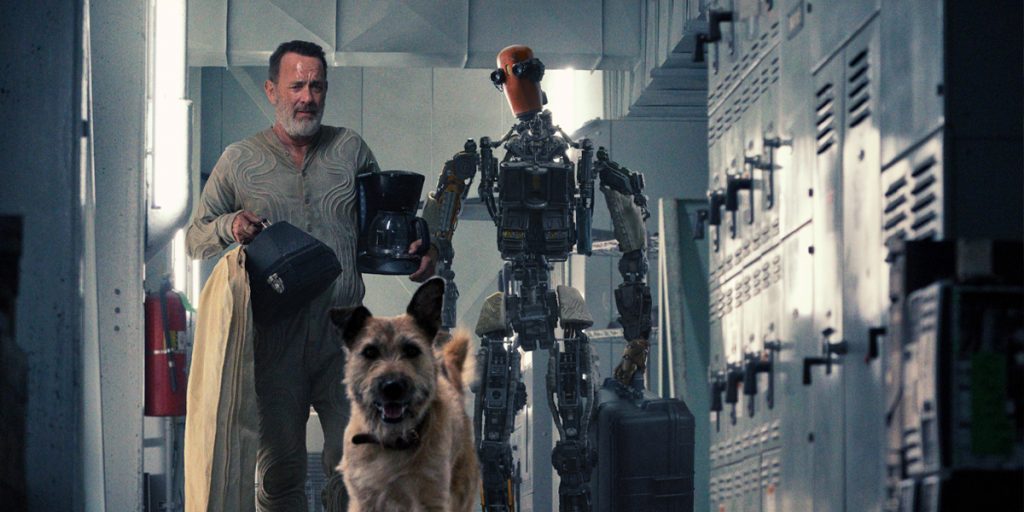With plenty of American Dream nostalgia and a great performance from Tom Hanks, AppleTV+’s Finch is ultimately a story about love in its purest form.
When we first meet Finch‘s titular protagonist, he’s wearing a UV suit and helmet and surrounded by an impenetrable yellow fog made of dust, wind, and smoke. As he walks in the deserted wasteland that has become St. Louis, Missouri and tries to reach an abandoned building, a sensor on his arm alerts him of the high UV radiation in the area, informing him that the temperature has reached 150°F, and inviting him to proceed with caution. As Finch (Tom Hanks, of Cast Away and News of the World) enters the building, which we now recognise as a supermarket, he sings to himself, lost in his own thoughts and mouthing the lyrics of Don McLean’s “American Pie.”
Just as we realise that our protagonist is accompanied by a robot companion of his own creation, Finch sings assortedly, “This will be the day that I die,” and we see an actual corpse on the floor. Of course, the choice of song is not inappropriate: the anthem of a generation, “American Pie” might appear to be about music, but it’s really about the American Dream coming to an end. “Miss American Pie” personifies the very essence of a specific time in American history, and “the day the music died” isn’t just a nostalgic farewell to rock n’ roll, but also to a country that no longer embodies the ideals it used to stand for in the 50s and 60s – in no small part, due to human behaviour and politics.
And the music has died, indeed, in Miguel Sapochnik’s (Game of Thrones) apocalyptic drama, a film that revolves around the most horrifying end-of-the-world scenario of all – the one that doesn’t originate from plagues, viruses, nuclear disasters or alien invasions, but from the consequences of our own actions. Though we don’t quite know to what extent the planet as a whole has been damaged in the scenario envisaged by the film, what we do know is that Finch’s corner of the world has been irrevocably lost, due to an exponential growth of the pollution in the atmosphere that resulted in a cataclysmic solar event that depleted the ozone layer and opened up “holes in the sky, like Swiss cheese.” And so, not only is the Earth subject to deadly tornadoes and sandwind that have claimed many human lives and destroyed pretty much everything, but UV radiation levels on the planet’s surface have increased exponentially, so much so that even something as natural as daylight has become dangerous to human health.
In the middle of all that is our sympathetic protagonist, a robotics engineer who has managed to survive the catastrophe by living in a bunker for a decade, and who spends his days trying to stay alive and escaping tornadoes, UV radiation and high temperatures, and his nights keeping to himself, avoiding the dangers that await in the shadows, which take the form of desperate, starving people who’d do anything to live another day. But Finch is, first and foremost, a story of love in its purest, most genuine and unadulterated form – which means, of course, that it also involves a dog. The film focuses on our protagonist and the family he has (quite literally) built for himself – a small robot with wheels called Dewey, and his beloved dog, Goodyear.
But the engineer knows his days on the planet are limited, given the extreme conditions in which he lives, and he has made it his mission to create a new, improved robot whose primary purpose would be to look after Goodyear when he’s gone. And so, he creates Jeff (Caleb Landry Jones, of Three Billboards Outside Ebbing, Missouri), an artificially intelligent being who has been imbued with a huge amount of knowledge on anything from “ionizing radiation” and “apocalypse survival” to practical skills and abstract thoughts, like the concept of absence. But just when the time has come to teach Jeff the basics of human behaviour, the weather gets worse, giving our team no other choice but to “get the hell out of St. Louis.” And so, a very hungry man, a very clever dog, a very resourceful robot who has recently lost an eye, and a very talkative robot who can barely walk leave the familiarity of their hometown and head towards the unknown, hoping to find shelter and looking out for one another in the process.

Finch is a story about survival, but it’s also about humanity. As you might expect from its premise, it’s in no small part a wake-up call on the disastrous consequences we might face in a not so distant future if we don’t start paying attention to the environment, as the world we are shown in the film is a desolate, hopeless land that is barely recognisable, and nature is an inescapable, untameable force that doesn’t spare anyone. But the film is also a much more introspective experience, focusing first and foremost on its characters, who go through all those emotions we found ourselves dealing with not long ago, when facing another kind of disaster.
Finch is clearly the product of a pandemic that has shown us that things can happen that are completely out of our control, and that the way we react to those events can ultimately show us what we’re made of. Just like we did during the pandemic, Finch goes through a series of emotions in the film, from denial to hope, from despair to acceptance. And, as all of that happens, he does the exact same things we did: he goes through the motions, he gets frustrated and then gets back up again, he loses his temper over the tiniest of things because he’s not used to being around others, and he ultimately deals with all of this by giving himself a purpose, and trying to stay alive in the process.
Finch is, at times, an incredibly tense experience, and even watching our heroes trying to secure their van to the ground during a storm can make us hold our breaths for minutes. At the same time, it’s also a film that uses its apocalyptic premise as a means to tackle many themes, such as the way certain things – like art or anecdotes, or even our own names – lose all their meaning when there’s no one around but you, or how our needs change and evolve as things happen to us. One of the subjects the film approaches is whether or not artificial intelligence can replace a human being, and learn everything there is to know about how to really experience life. Finch’s relationship with Jeff is full of complex dynamics that are, at times, reminiscent of a father-son relationship, as our protagonist has to change his ways of life to make room for someone else, and that leads to unpredictable developments that Finch doesn’t quite know how to handle.
And not only is Jeff is not to blame, as his only mistake is taking his creator’s instructions to the letter, but he often provides exactly the kind of rationality – a rationality that is often surprisingly human – that Finch needs. Jeff’s presence is key in the film, as it’s what changes many dynamics in Finch’s world and gets him to find within himself all the values and emotions that a lifetime of hardships has taken from him, and helps him remember what it is exactly that makes life worth living. Even more meaningful is Finch’s relationship with his dog – an expert in unconditional love, and a creature that, by nature, is able to live in the present and experience life to the fullest: it’s through this bond that we’re shown the importance of companionship – the kind of connection that can’t be manufactured, and that ultimately keeps us alive.
Needless to say, Tom Hanks is exceptional, in his comfort zone as a fundamentally good human being who has survived many adversities and who ultimately finds himself on his own. Just like in Cast Away, Hanks is the glue that holds the entire film together, so much so that we often forget that he’s the only human being in the film. Aided by camera movements that often focus on his face, Hanks is able to deliver an impressive range of emotions, conveying the character’s entire past with looks alone, and making Finch all the more well-rounded and believable with great physical acting. There is one key scene in particular that will turn you into an emotional wreck, and credit is due to Hanks for bringing such intensity and believability to the role.
Finch also features one of the most impressive canine performances of the year, also thanks to the expressiveness of the dog who plays Goodyear, a character who is always “his own dog,” to use Finch’s words, and who is fundamental in the film’s narrative. As for the robots, if the silent but very expressive Dewey is reminiscent of Star Wars‘ BB8 in terms of his human-like movements and attitudes, Jeff is paradoxically not as likable even if he can talk, but he’s ultimately just as important to the story because of the compelling character arc he is given.
Finch‘s clever screenplay (Craig Luck and Ivor Powell) also helps with the emotional component of the film, mastering the art of showing, not telling with the use of storytelling devices that give the characters a past and a present, and make their reality more believable. The film’s cinematography (Jo Willems, of Hard Candy) also helps convey all the urgency and tension of the film, with lighting and camerawork that enable us to see Finch’s face and movements even in darkness, and impressive world-building that always makes the events on the screen feel real.
Finch struggles a little bit with pacing, especially in its second half, which is also where the switch of tone between the film’s most tense, apocalyptic scenes and its more introspective section can feel a little abrupt and not entirely original. However, it needs to be kept in mind that the film juggles a huge amount of themes – from environmental issues to isolation, artificial intelligence, human relationships, and even the meaning of life – and does it in a way that always keeps us invested in its narrative, which is what ultimately makes it a success. Finch is a story of survival, but it’s also an invitation to live life to the fullest, and experience things firsthand no matter how broken and unrecognisable your world has become. The uniqueness of the film’s premise will draw you in, but it’s its emotional core that will get through to you, and stay with you long after the credits roll.
Finch will premieres globally on AppleTV+ on November 5, 2021.

